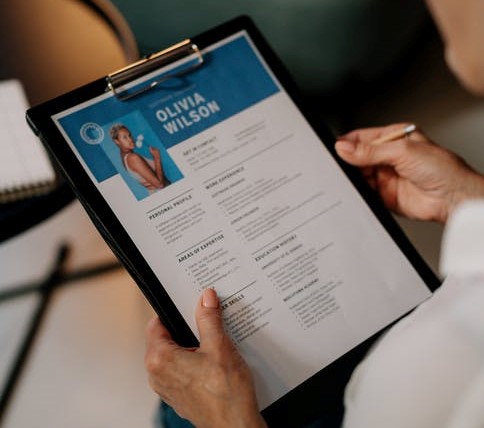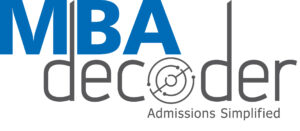
By Definition, a resume is a document that communicates your qualifications and sets you up for career success. For MBA applicants, it sets you up for admission success.
An MBA Resume is normally the first document read by the admissions team, so it plays a pivotal role in setting the first impression. And, as an eager MBA aspirant it’s your responsibility to make sure this impression is in your favor.
Here, we list down some of the most common mistakes we see on MBA resumes, and ones that you should not make to set yourself up for admission success.
1. Formatting Errors
An MBA resume does not need fancy formatting and this one is our biggest peeve when we see resumes for profile evaluations. Just a plain document with perfect alignments is good enough. It should be visually appealing- which means it should not be cluttered so that adcom can easily read through it.
Here’s what you should NOT be doing:
- Preferably don’t use tabular formats with text-boxes.
- Don’t use colorful font – keep the text to simple black.
- Don’t put your picture on the resume. Also, skip mentioning age and marital status.
- Don’t eat into your margins. In a resume, less is MORE. From the content perspective, be generous with your editing and keep only your most impactful bullets rather than jotting down every little piece of information and thus diluting the overall impact.
Do this instead:
- Your alignments should be consistent:
i. Bullets should be vertically aligned. Fonts should be consistently used.
ii. Font size should be at least 10 (Arial, Calibri, Times New Roman are all good)
iii. Right-hand-side text like “dates”, “place” should be aligned. - A resume should be without clutter and with white space. As a guideline, you can leave margins of at least .75″ on the left and right side and 1” each on the top and bottom of the page.
- Be consistent with the currencies. We often see resumes that have INR, $ and € all on one document.
2. Having a Career Objective section:
As this is not a job resume, you can skip the career objective section. The objective here is very clear -to get an MBA admission. The MBA resume is only a page long, so you have to maintain an economy of space. Therefore don’t distract the adcom from access to the more important sections of your resume- Employment, Education and Additional Information.
3. Not mentioning leadership & impact but only responsibilities.
The most important evaluation criteria for adcoms across b-schools are your achievements, quantitative impact, and career progression. There is no better place in the application than the resume to highlight these.
Yet, we find most applicants frame their bullets around day-to-day responsibilities. These don’t tell what you achieved and how impactful was this achievement for your organization.
For example, did you help achieve the highest revenue or did you create a new revenue stream, did you help save costs, did you complete your work in the least possible time, leading to a cost-save? These are achievements that impress.
Do these to make your resume shine like Gold:
1. Start your bullets with verbs that show definite action such as Increased, Improved, Expanded, Innovated, Developed, Pioneered, Saved, among others. These show that you brought change. moved the needle from point A to point B, making things better.
2. Ensure the achievement is related to YOU. A common mistake we notice is, applicants describing what the project was about rather than telling what instrumental role they played in the project. Remember, you are the hero of your resume so keep the achievement’s description to yourself.
3. Quantify your achievements, so that adcoms can understand the scale of impact you created. Examples are:
- Increased revenues by $1M per annum by….
- Saved USD 100K and reduced man-hours by 50% by….
- Reduced application defect rate by 50% by implementing best practice…
- Improved digital engagement rates by 50% for a $10B US automotive company…
4. Your career progression must reflect on the MBA resume. Keep your designations clear and let it be visible that your work got increasingly challenging as you moved up the ladder. Certain things you should mention:
- Out of turn promotions.
- Selection for exclusive roles.
- Designation changes.
4. Omitting relevant details in the education section.
The education section helps to showcase your academic strength as well as your extra-curricular activities. This is important as b-schools desire candidates with a well-rounded personality – those who are academically strong while also being involved in extra-curricular activities. Such candidates are multi-faceted and therefore are more likely to succeed in b-school and beyond. Also, mentioning extra-curricular activities signifies your ability to take leadership positions and contribute for the benefit of your classmates.
We find that many applicants provide details in this section that are not so relevant for their MBA candidature.
Here are some dos and don’ts for this section:
Don’t:
- Mention your Grade 10th and Grade 12th exam results. Any educational details before the undergrad are not relevant in the MBA resume. However, do mention details of your masters studies or professional courses such as CA, CFA, CS.
- Make your resume technical by mentioning technical courses, publications or certifications unless they are relevant for your MBA education or your post-MBA career goals.
Do include:
- Your marks along with rank in class
- Scholarships or distinctions earned
- Your extra-curricular activities – the leadership positions held and the impact created.
5. Using Jargon
For effective communication, it’s vital you keep your target audience in mind while drafting your resume. The adcom members will most likely not be from your industry and will therefore not understand the jargon used within your industry or your organisation. Instead, talk in a simple yet impactful language that the adcom quickly understands. Remove any jargon that can be unknown to them. Secondly, abbreviations are related to industries, so avoid using these. Thirdly, an MBA resume is not the right place to highlight your technical skill or proficiency.
Remember, the one skill that should be dripping from your resume is Leadership. Any space you spend showcasing your technical expertise will take away an opportunity to highlight your leadership skills.
And with this, we’ll mention a bonus point that YOU SHOULD be doing, that will give you a chance to demonstrate more leadership.
6. Add an “Additional Information” section
Here, you should provide achievements outside of work. Include volunteering work, entrepreneurial stints, any non-work-related initiatives you have led. Once again, mention not just the names of these activities, but also the impact you created.
For example, it will not be enough to tell that you are an Academic Support Volunteer at XYZ NGO, but also mention how you transformed the syllabus to make it comprehensive, thereby helping70 children improve their grade 6 scores.
End your resume on a lighter note- tell the adcom what are your interests and hobbies. This will bring some color to an otherwise formal resume. Leave the adcom thinking, “this person is interesting and I want to meet them”.
